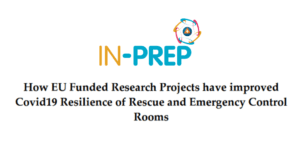
Research carried out on behalf of the IN-PREP Project by our partners in the Italian National Fire and Rescue Service (CNVVF) has shown that EU funded research projects have helped to improve the resilience of emergency control rooms during the Covid-19 crisis.
The study outlines how technology (such as IN-PREP’s MRPP) funded through Horizon 2020 grants has allowed frontline agencies to exchange information and data during Covid-19 despite social distancing regulations.
This has helped first responders to overcome existing barriers in language, location and technology. This has meant limiting the risk to those working in the emergency services by allowing them to collaborate remotely during the Covid-19 pandemic.
The study titled ‘’How EU Funded Research Projects have improved Covid-19 Resilience of Rescue and Emergency Control Rooms’’ can be found here.
Below you will find a press release issued by the IN-PREP Project to publicise this important research.
 Media Release
Media Release
Study finds EU Research Projects have improved the Response of Emergency Services during Covid-19
- Research carried out by the Italian Fire and Rescue Service shows EU-funded projects are helping emergency services to collaborate despite location, language and technological barriers
- Newly-developed technology allows frontline agencies to exchange information and data during Covid-19 despite social distancing regulations
- This collaborative approach has improved the protection of the emergency and rescue services battling the Covid-19 pandemic
May 21st 2020: The latest research carried out by the Italian Fire and Rescue Service shows that EU-funded research projects have improved how first responders are working together in light of Covid-19.
The study, part of the IN-PREP and Fire-In Projects, shows that recent technological developments have allowed the emergency services to exchange data in a more effective way, overcoming the existing barriers in location, language and technology and protecting workers in the emergency services who are responding to Covid-19.
Stefano Marsella of the Italian Fire and Rescue Service, who co-authored the study said: ‘’The ability to exchange information quickly and effectively between those responding to disasters is a core element of crisis management which is made more complex due to the number of agencies involved, their location and differences in language and technology used.’’
‘’Responding to Covid-19 has meant agencies at both a local and national level need to work together despite social and physical distancing regulations. Up to now this has been a difficult and complex task but recent developments from EU research projects are allowing this collaboration to take place in a safe, coordinated way. The technological side of the challenge can be considered substantially overcome.’’
The study highlights the IN-PREP Project, funded under the EU’s Horizon 2020 grants as one such research project which is allowing agencies to work together while limiting the health risks presented to frontline workers.
Evangelos Sdongos, IN-PREP Project Coordinator said: ‘’The outbreak of Covid-19 throughout Europe has brought the issue of planning for such disasters into the wider public consciousness. IN-PREP, through our Mixed Reality Preparedness Platform (MRPP) technology have proven that it is possible to coordinate a response to a large-scale crisis despite the differences in technologies used by agencies across Europe.
Our MRPP allows agencies to train, plan and collaborate together remotely by facilitating efficient chain-of-command and asset management during disasters. As the study carried out by the Italian Fire and Rescue Service notes, our MRPP has been successfully tested in a number of field exercises so far and we hope that our technology can assist agencies across Europe in the future management of complex crises such as Covid-19.’’

